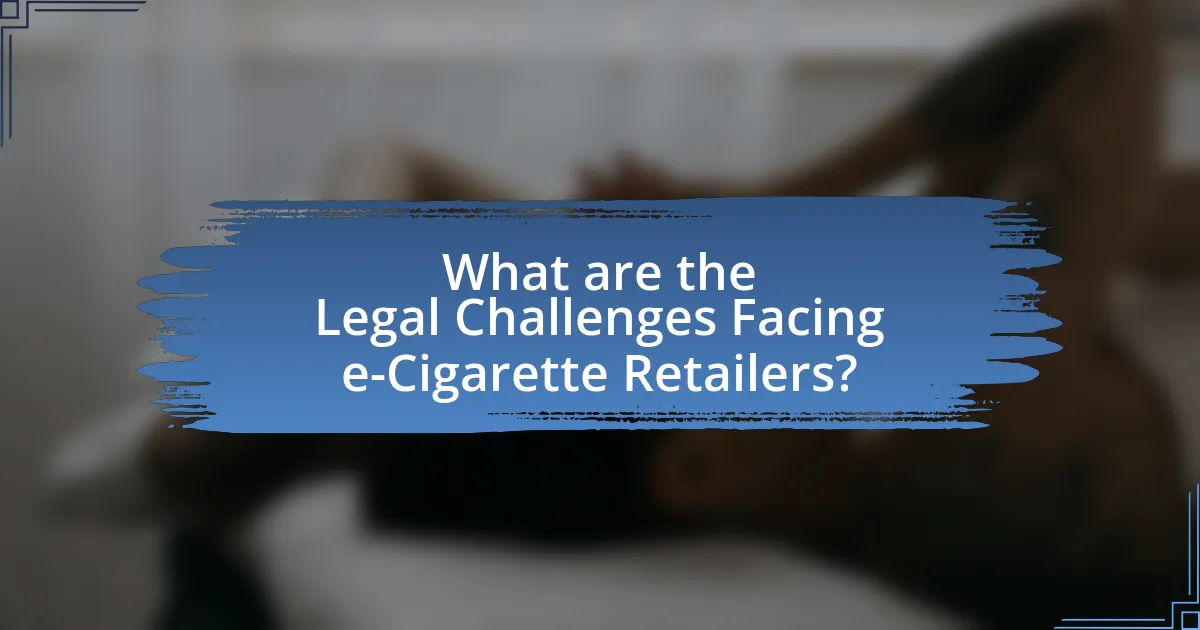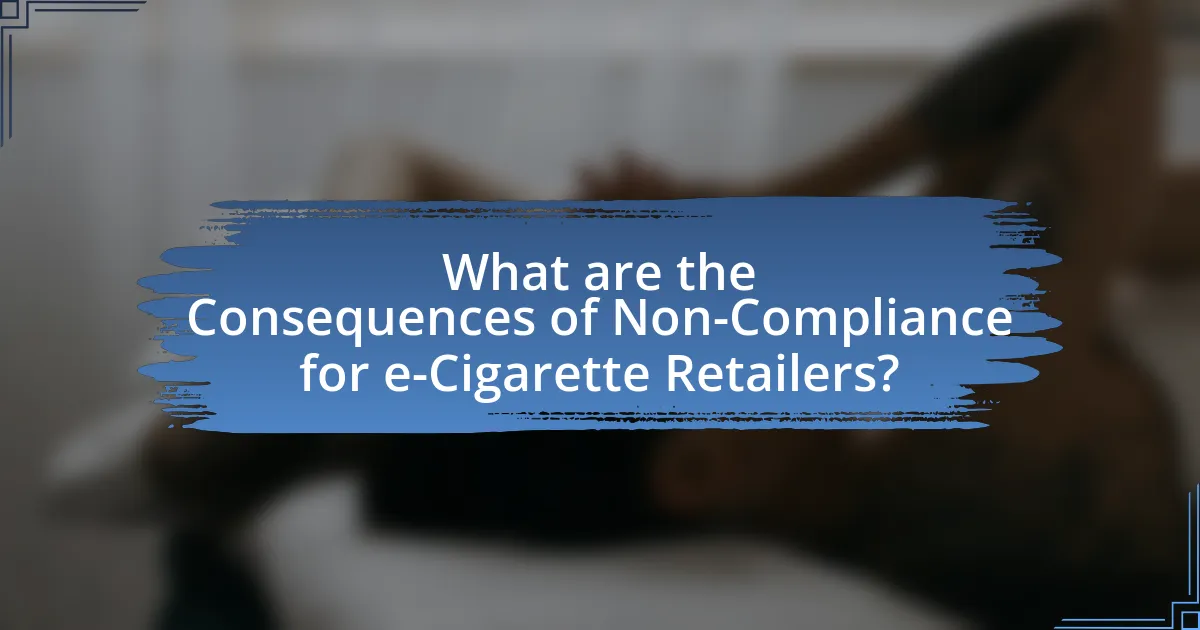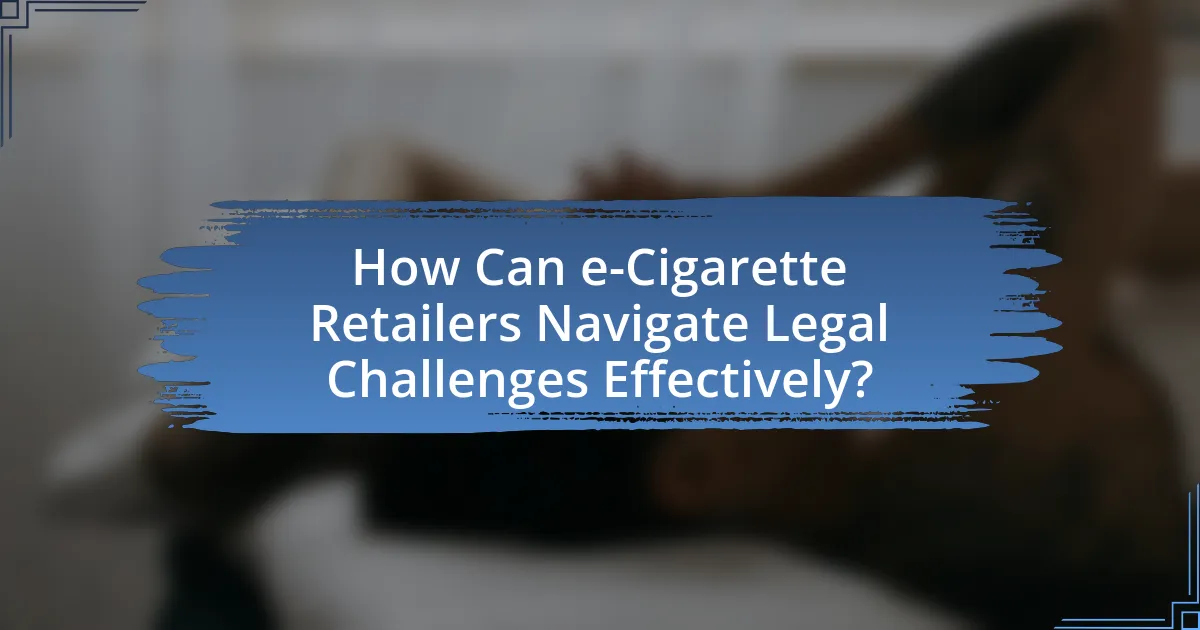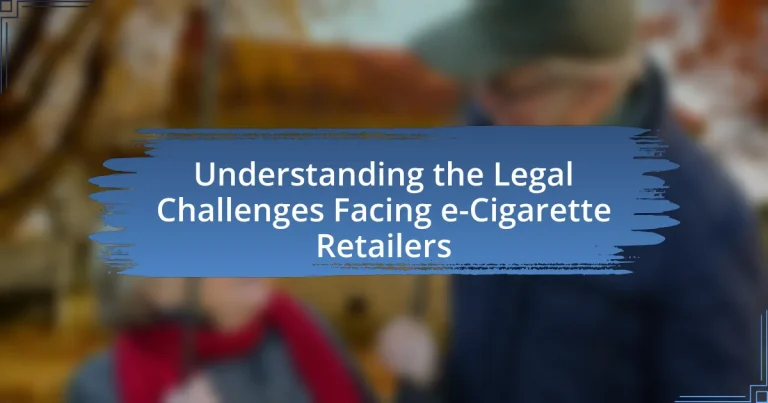The article focuses on the legal challenges faced by e-cigarette retailers, highlighting key issues such as regulatory compliance, age restrictions, and advertising limitations. It examines how regulations differ across regions, including federal laws like the Tobacco Control Act and state-specific regulations that can create a complex legal landscape. The article also discusses the importance of age verification processes, the penalties for non-compliance, and the implications of lawsuits on retailers. Additionally, it outlines best practices for compliance and the role of legal counsel in navigating the evolving regulatory environment.

What are the Legal Challenges Facing e-Cigarette Retailers?
e-Cigarette retailers face several legal challenges, primarily including regulatory compliance, age restrictions, and advertising limitations. Regulatory compliance involves adhering to federal and state laws, such as the Tobacco Control Act, which mandates specific labeling and health warnings. Age restrictions are enforced to prevent sales to minors, with many states implementing laws that require retailers to verify the age of customers. Additionally, advertising limitations restrict how e-cigarette products can be marketed, particularly concerning claims about health benefits or targeting youth demographics. These challenges are compounded by ongoing litigation and evolving legislation, which can create uncertainty in the market.
How do regulations vary across different regions for e-Cigarette retailers?
Regulations for e-Cigarette retailers vary significantly across different regions, reflecting local public health policies and cultural attitudes towards vaping. For instance, in the United States, the Food and Drug Administration (FDA) regulates e-Cigarettes as tobacco products, requiring manufacturers to submit products for premarket review, while some states impose additional restrictions such as age limits and flavor bans. In contrast, the European Union enforces the Tobacco Products Directive, which mandates child-resistant packaging and limits nicotine concentration, but allows for a wider range of products compared to the U.S. Furthermore, countries like Australia classify e-Cigarettes containing nicotine as prescription-only medicines, severely limiting their availability. These regional differences illustrate the complex legal landscape that e-Cigarette retailers must navigate, influenced by varying health concerns and regulatory frameworks.
What are the key federal regulations impacting e-Cigarette sales?
The key federal regulations impacting e-Cigarette sales include the Family Smoking Prevention and Tobacco Control Act, which grants the FDA authority to regulate tobacco products, including e-cigarettes. This act mandates that e-cigarette manufacturers must submit their products for FDA review and approval, ensuring they meet safety and health standards. Additionally, the Tobacco Control Act prohibits the sale of e-cigarettes to individuals under 21 years of age, aligning with the minimum legal age for tobacco products established by federal law. Furthermore, the FDA’s Deeming Rule extends its regulatory authority to e-cigarettes, requiring manufacturers to include health warnings on packaging and restrict marketing practices aimed at youth. These regulations collectively aim to reduce the public health impact of e-cigarettes and ensure consumer safety.
How do state and local laws differ in their approach to e-Cigarette retailing?
State and local laws differ significantly in their approach to e-Cigarette retailing, with states often establishing broad regulations while local jurisdictions implement more specific rules. For example, some states may set a minimum legal age for purchasing e-Cigarettes at 21, but local governments can impose additional restrictions, such as banning sales in certain areas or requiring special permits for retailers. This variation can lead to a patchwork of regulations that retailers must navigate, as seen in California, where state law allows e-Cigarette sales but local cities like San Francisco have enacted outright bans. Such differences create challenges for compliance and can affect market access for retailers.
What role do age restrictions play in e-Cigarette retailing?
Age restrictions play a critical role in e-Cigarette retailing by regulating the sale of these products to minors, thereby aiming to reduce youth access and consumption. These restrictions are enforced through laws that typically set the minimum purchasing age at 18 or 21 years, depending on the jurisdiction. For instance, the U.S. federal law raised the minimum age for purchasing tobacco products, including e-Cigarettes, to 21 in 2019, reflecting a growing concern over the health impacts of nicotine on adolescents. Compliance with these age restrictions is essential for retailers to avoid legal penalties, including fines and potential loss of licenses, which underscores the importance of age verification processes in retail operations.
How are age verification processes implemented by retailers?
Retailers implement age verification processes primarily through technology-driven solutions and manual checks. These processes often involve requiring customers to present valid identification, such as a driver’s license or passport, to confirm their age before completing a purchase. Many retailers utilize age verification software that scans IDs and cross-references them with databases to ensure authenticity and compliance with legal age restrictions. According to a report by the National Association of Convenience Stores, 70% of retailers use electronic age verification systems to enhance accuracy and reduce the risk of selling to underage customers. This combination of technology and manual verification helps retailers navigate the legal challenges associated with selling age-restricted products, such as e-cigarettes.
What penalties do retailers face for non-compliance with age restrictions?
Retailers face various penalties for non-compliance with age restrictions, including fines, license suspension, and potential criminal charges. For instance, in the United States, retailers can incur fines ranging from $500 to $2,000 for first-time violations, escalating for repeated offenses. Additionally, some states may impose a temporary suspension of the retailer’s license to sell age-restricted products, which can last from a few days to several months. In severe cases, retailers may face criminal charges, leading to more significant legal repercussions. These penalties are enforced to ensure compliance with laws aimed at protecting minors from accessing harmful products, such as e-cigarettes.
What are the advertising restrictions for e-Cigarette products?
Advertising restrictions for e-Cigarette products include prohibitions on marketing to minors, limitations on health claims, and restrictions on advertising in certain media. The Family Smoking Prevention and Tobacco Control Act prohibits the sale and distribution of e-Cigarettes to individuals under 21 years of age, which extends to advertising practices that could appeal to this demographic. Additionally, the FDA mandates that e-Cigarette advertisements cannot make misleading health claims or imply that these products are safer than traditional cigarettes without scientific evidence. Furthermore, many states and local jurisdictions impose additional restrictions, such as banning e-Cigarette ads in public spaces or near schools. These regulations aim to reduce youth exposure and prevent misleading information about the health effects of e-Cigarettes.
What types of advertising are prohibited for e-Cigarette retailers?
E-cigarette retailers are prohibited from advertising that targets minors, promotes health benefits, or makes misleading claims about the products. Specifically, regulations restrict advertisements that can be seen by individuals under the legal smoking age, such as those placed in schools or near playgrounds. Additionally, claims suggesting that e-cigarettes are a safe alternative to smoking or that they can aid in quitting smoking are also banned, as these can mislead consumers about the risks associated with vaping. These prohibitions are enforced to protect public health and prevent youth access to nicotine products.
How do advertising regulations affect marketing strategies for retailers?
Advertising regulations significantly influence marketing strategies for retailers by imposing restrictions on how products can be promoted. Retailers must navigate these regulations to ensure compliance, which often leads to more cautious and targeted marketing approaches. For instance, regulations may limit the use of certain imagery or language that could appeal to minors, compelling retailers to adopt strategies that focus on adult audiences while avoiding misleading claims. This is particularly relevant in the e-cigarette industry, where the FDA has established strict guidelines on advertising to prevent youth access and promote public health. Consequently, retailers may invest in educational campaigns that emphasize responsible use rather than aggressive promotional tactics, aligning their strategies with regulatory requirements to mitigate legal risks.

What are the Consequences of Non-Compliance for e-Cigarette Retailers?
Non-compliance for e-cigarette retailers can result in severe legal and financial consequences. Retailers may face hefty fines, which can range from thousands to millions of dollars, depending on the severity of the violation and local regulations. For instance, the FDA has imposed fines exceeding $12,000 for violations related to underage sales. Additionally, non-compliance can lead to the suspension or revocation of licenses, effectively halting business operations. Retailers may also encounter lawsuits from consumers or advocacy groups, further increasing financial liabilities. Furthermore, negative publicity from non-compliance can damage a retailer’s reputation, leading to decreased sales and loss of customer trust.
What legal actions can be taken against non-compliant retailers?
Legal actions that can be taken against non-compliant retailers include fines, license suspension or revocation, and civil lawsuits. Regulatory agencies, such as the Food and Drug Administration (FDA) in the United States, can impose monetary penalties for violations of e-cigarette regulations, which can reach thousands of dollars. Additionally, state and local authorities may revoke or suspend business licenses for repeated non-compliance, effectively halting operations. Civil lawsuits can also be initiated by consumers or advocacy groups seeking damages for harm caused by non-compliant practices, such as selling to minors or failing to adhere to labeling requirements. These actions are supported by various laws and regulations aimed at protecting public health and ensuring compliance within the retail sector.
What are the potential fines and penalties for violating e-Cigarette laws?
Violating e-Cigarette laws can result in fines ranging from hundreds to thousands of dollars, depending on the severity of the violation and the jurisdiction. For instance, federal penalties for selling e-Cigarettes to minors can reach up to $11,000 per violation, while state laws may impose additional fines and penalties, including license suspensions or revocations. In some cases, retailers may also face civil lawsuits or criminal charges, further increasing the financial and legal repercussions.
How can legal issues impact a retailer’s business operations?
Legal issues can significantly impact a retailer’s business operations by imposing restrictions that affect sales, marketing, and compliance practices. For instance, e-cigarette retailers face stringent regulations regarding advertising, age verification, and product labeling, which can limit their ability to reach customers and promote their products effectively. According to the FDA, non-compliance with these regulations can result in fines, product seizures, or even business closures, demonstrating the critical nature of legal adherence in maintaining operational viability.
What are the implications of lawsuits for e-Cigarette retailers?
Lawsuits for e-Cigarette retailers can lead to significant financial and operational implications. These legal challenges often result in increased legal costs, potential settlements, and damages that can strain a retailer’s financial resources. For instance, a study by the American Journal of Public Health indicated that e-Cigarette companies faced over $2 billion in lawsuits related to health claims and marketing practices. Additionally, lawsuits can damage a retailer’s reputation, leading to decreased consumer trust and potential loss of sales. Regulatory scrutiny may also intensify, resulting in stricter compliance requirements and operational changes. Overall, the implications of lawsuits can severely impact the sustainability and growth of e-Cigarette retailers.
What types of lawsuits are commonly faced by e-Cigarette retailers?
E-cigarette retailers commonly face lawsuits related to product liability, regulatory compliance, and marketing practices. Product liability lawsuits arise when consumers claim that e-cigarette products caused harm or injury, often citing defective design or inadequate warnings. Regulatory compliance lawsuits occur when retailers are accused of violating federal or state laws regarding the sale and distribution of e-cigarettes, including age restrictions and health warnings. Additionally, marketing practice lawsuits can stem from allegations of misleading advertising or targeting minors, which have been increasingly scrutinized by regulatory bodies. These types of lawsuits reflect the complex legal landscape surrounding the e-cigarette industry, influenced by evolving regulations and public health concerns.
How can retailers protect themselves from legal action?
Retailers can protect themselves from legal action by implementing comprehensive compliance programs that adhere to federal, state, and local regulations governing e-cigarette sales. These programs should include regular training for employees on legal requirements, accurate age verification processes, and clear labeling of products to ensure consumer safety.
For instance, the Family Smoking Prevention and Tobacco Control Act mandates strict age restrictions on tobacco products, including e-cigarettes, and retailers must verify the age of customers to avoid penalties. Additionally, maintaining thorough documentation of all transactions and compliance efforts can serve as evidence of adherence to legal standards, thereby reducing liability in case of disputes.

How Can e-Cigarette Retailers Navigate Legal Challenges Effectively?
e-Cigarette retailers can navigate legal challenges effectively by staying informed about regulations, implementing compliance programs, and engaging with legal experts. Staying updated on federal, state, and local laws is crucial, as regulations can vary significantly; for instance, the FDA has specific guidelines regarding marketing and sales of e-cigarettes. Compliance programs help retailers ensure that their practices align with legal requirements, reducing the risk of penalties. Additionally, consulting with legal experts who specialize in tobacco law can provide tailored advice and strategies to address specific legal issues, as evidenced by the increasing complexity of regulations in the industry.
What best practices should e-Cigarette retailers adopt to ensure compliance?
e-Cigarette retailers should adopt comprehensive age verification processes to ensure compliance with legal regulations. Implementing robust systems that verify the age of customers at the point of sale, both online and in-store, is essential to prevent sales to minors. According to the FDA, retailers must ensure that they do not sell tobacco products, including e-cigarettes, to individuals under the age of 21, which is mandated by federal law. Additionally, retailers should maintain accurate records of all transactions and customer verifications to demonstrate compliance during inspections. Regular training for staff on legal requirements and responsible selling practices further reinforces adherence to regulations. These practices collectively help mitigate legal risks and promote responsible retailing in the e-cigarette industry.
How can retailers stay updated on changing regulations?
Retailers can stay updated on changing regulations by subscribing to industry newsletters, attending relevant trade shows, and engaging with legal experts. These methods provide timely information on regulatory changes affecting e-cigarette sales. For instance, organizations like the American Vaping Association regularly publish updates on legislation, while trade shows often feature sessions on compliance. Additionally, consulting with legal professionals who specialize in tobacco and e-cigarette law ensures that retailers receive tailored advice on navigating complex regulations.
What resources are available for legal guidance in the e-Cigarette industry?
Legal guidance resources in the e-Cigarette industry include law firms specializing in tobacco and vaping regulations, industry associations like the Vapor Technology Association, and government websites such as the Food and Drug Administration (FDA) that provide regulatory information. These resources offer insights into compliance with federal, state, and local laws, including marketing restrictions and product safety standards. For example, the FDA’s Center for Tobacco Products outlines specific regulations that e-Cigarette manufacturers and retailers must follow, ensuring that businesses remain compliant with legal requirements.
What strategies can retailers implement to mitigate legal risks?
Retailers can mitigate legal risks by implementing comprehensive compliance programs that adhere to federal, state, and local regulations governing e-cigarette sales. These programs should include regular training for employees on legal requirements, age verification processes to prevent sales to minors, and clear labeling of products to ensure transparency. Additionally, retailers should maintain accurate records of transactions and customer interactions to provide evidence of compliance during audits or legal inquiries. According to the FDA, non-compliance with regulations can lead to significant penalties, emphasizing the importance of proactive legal risk management strategies.
How can effective training programs help in compliance efforts?
Effective training programs enhance compliance efforts by equipping employees with the necessary knowledge and skills to adhere to legal regulations. These programs provide clear guidelines on compliance requirements specific to the e-cigarette industry, such as age verification laws and marketing restrictions. Research indicates that organizations with comprehensive training initiatives experience a 50% reduction in compliance violations, demonstrating the effectiveness of structured education in fostering a culture of compliance. By ensuring that employees understand the legal landscape, training programs mitigate risks associated with non-compliance, ultimately protecting the business from potential legal repercussions.
What role does legal counsel play in navigating e-Cigarette regulations?
Legal counsel plays a critical role in navigating e-Cigarette regulations by providing expertise on compliance with federal, state, and local laws governing the sale and marketing of these products. Legal professionals help e-Cigarette retailers understand the complex regulatory landscape, which includes the Family Smoking Prevention and Tobacco Control Act and various state-specific laws that may impose additional restrictions. They also assist in interpreting guidelines from the Food and Drug Administration (FDA) and other regulatory bodies, ensuring that businesses adhere to labeling, advertising, and health warning requirements. Furthermore, legal counsel can represent retailers in disputes or litigation related to regulatory compliance, thereby mitigating legal risks and potential penalties.
What are the common pitfalls e-Cigarette retailers should avoid?
e-Cigarette retailers should avoid non-compliance with regulations, misleading marketing practices, and inadequate age verification processes. Non-compliance with regulations can lead to hefty fines and legal action, as the e-Cigarette industry is heavily regulated in many jurisdictions. Misleading marketing practices, such as making unsubstantiated health claims, can result in penalties from regulatory bodies like the Federal Trade Commission. Inadequate age verification processes can lead to selling products to minors, which not only harms public health but also exposes retailers to legal liabilities and loss of licenses.
How can misunderstanding regulations lead to legal issues?
Misunderstanding regulations can lead to legal issues by causing e-cigarette retailers to inadvertently violate laws, resulting in penalties or lawsuits. For instance, if a retailer misinterprets age verification requirements, they may sell products to underage customers, leading to fines or loss of licenses. According to the FDA, non-compliance with regulations can result in civil penalties, including monetary fines and legal actions against the business. This highlights the critical importance of accurately understanding and adhering to regulatory frameworks to avoid significant legal repercussions.
What are the consequences of inadequate record-keeping for retailers?
Inadequate record-keeping for retailers can lead to significant legal and financial consequences. Retailers may face penalties for non-compliance with regulations, as accurate records are often required to demonstrate adherence to laws governing sales, particularly in regulated industries like e-cigarettes. For instance, failure to maintain proper age verification records can result in fines or loss of licenses, as seen in cases where retailers were penalized for selling to minors. Additionally, poor record-keeping can hinder inventory management, leading to stock discrepancies and potential revenue loss. This lack of oversight can also expose retailers to fraud and theft, further impacting their financial stability.
